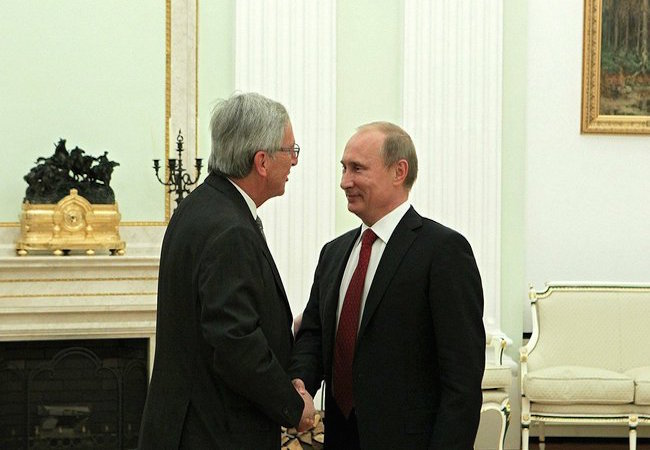
By Abdul Ruff
According to reports, European Commission chief Jean-Claude Juncker is meeting President Vladimir Putin in Russia in June in the first visit by a senior EU official since it imposed sanctions against Moscow in 2014.
Juncker’s spokesman Margaritis Schinas, at a daily briefing in Brussels, confirmed that Juncker has been invited “and plans to participate in the St Petersburg International Economic Forum on the 16th of June”.
However, Brussels insisted that Juncker’s June 16 visit to St Petersburg does not conflict with an upcoming European Union decision on whether to renew sanctions over the annexation of Crimea and the conflict in eastern Ukraine.
Former Luxembourg Prime Minister Juncker “will use this opportunity to convey to the Russian leadership as well as to a wider audience the EU’s perspective regarding the current state of EU-Russia relations.” Asked if he would hold direct talks with Putin, Schinas said it was “evident that the two leaders being there will have to meet, because they will be there attending the same forum.”
Juncker’s spokesman denied that the visit would be at odds with the EU’s stance on Russia, with EU leaders expected to renew sanctions on Russia’s banking, defence and energy sectors that expire in July. “We don’t see inconsistency with the decision of the President to attend the St Petersburg International Economic Forum,” Schinas told reporters.
But the Kremlin welcomed the EU’s “readiness” for dialogue after two years with relations at their lowest ebb since the Cold War, but warned against expectations of any breakthrough from the Putin-Juncker meeting. In Moscow, Putin’s foreign policy advisor, Yuri Ushakov, confirmed Putin would meet Juncker “within the framework” of the forum. Kremlin spokesman Dmitry Peskov said that “we of course welcome this readiness” for dialogue with the 28-nation European Union.
Peskov added: “I would probably not give in to excessive optimism and look for signs of a fracture in every move….The descent into the sanctions rhetoric, the rejection of dialogue and cooperation on many fronts, all these of course have negative consequences. Avoiding these consequences in one hour will be impossible.” Russia feels the EU move may not be genuine but treats the move as an essential step in reducing mutual tensions.
The West accuses Moscow of backing pro-Russian rebels in eastern Ukraine and unnecessarily and militarily intervening in Syrian crisis, adding to the deaths and destructions in that Islamic country.
Juncker backed the position taken by the G7 summit in Japan last week that the lifting of sanctions depends on Russia implementing the Minsk peace agreements and respect for Ukraine’s sovereignty, the spokesman added. “Sanctions can be rolled back when Russia meets its commitments, but also we stand ready to take further actions to increase costs in case that Russia’s actions should so require,” he said, doubting the seriousness of Russian statements.
The Minsk accord, mediated by France and Germany and in the presence of President Putin, was signed in February 2015 calling for a ceasefire, along with a range of political, economic and social measures to end the conflict in eastern Ukraine. EU foreign ministers decided in March that there could be “selective engagement” with Russia on certain issues.
All said and done, Juncker’s June 16 visit to Russia is important not just in reducing trust deficit and mutual tensions but influencing the US strategists to be less forceful in their condemnation of Russia, though it would be unrealistic to expect a sea change in West-Russia relations. At least not so soon!




